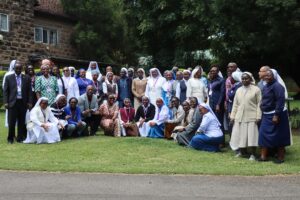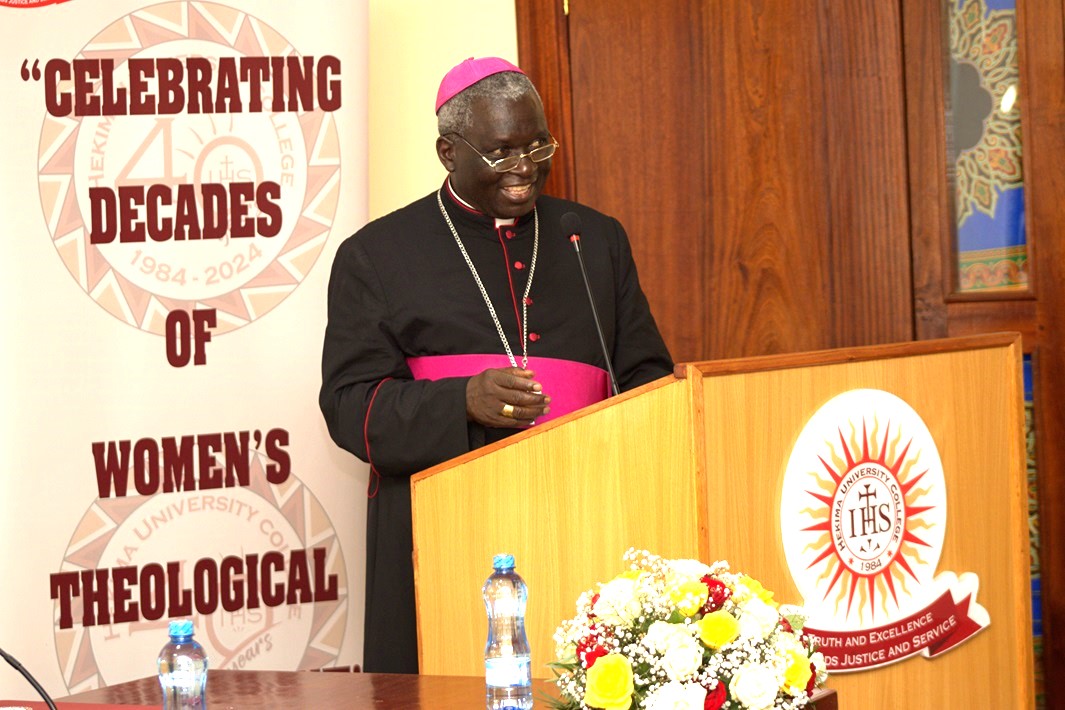NAIROBI, MARCH 15, 2024 (CISA) – “My daughters, the world needs to hear your unique song The Church needs the richness of your perspective to address the challenges of our times,” said Most Rev Philip Anyolo of the Catholic Archdiocese of Nairobi.
In his address at the end of a four-day conference of the African Women Theologians at Hekima University College (HUC) that took place from March 7 to 10, 2024, Archbishop Anyolo dispelled the notion of women theologians as competitors to their male counterparts, and instead called for collaboration toward a common purpose envisioning a Church where men and women work together to build a community that reflects the rich diversity of God’s creation.
“I stand before you today, as a fellow pilgrim on the journey of faith, a fellow labourer in the vineyard of the Lord. A journey that for far too long has been the brimming theological insight and pastoral experience, of women theologians and their contributions minimized. But the tide is turning. As I look out at this gathering of brilliant minds and compassionate hearts, I am filled with immense hope for the future of our Church, a future where the voices of African women theologians will not just be heard, but will become a resounding chorus that shapes the very core of our Synodal journey,” said the archbishop.

“You are not competitors to your male counterparts. Men and women theologians and lay people build a Church that reflects the beautiful diversity of God’s creation. However, as collaborators, working alongside your brothers in Christ is for the common purpose of a more just and holistic society,” he stated.
The archbishop echoed Pope Francis’s call for the inclusion of women in various aspects of the Church. He emphasized the importance of women theologians engaging with challenges facing their communities, including gender inequality and environmental degradation, and offering theological frameworks for healing and hope.
“Let your femininity a wellspring of creativity, empathy, compassion, and nurturing strength, be the very essence of your theological exploration. Engage with the challenges facing our communities, gender inequality and environmental degradation – and offer a theological framework of healing and hope”, he said, noting “Be the bridge between the academy and the lived realities on the ground. Let your lived experiences as mothers, daughters, sisters, and leaders in theological discourse guide you.”
Archbishop Anyolo further urged the women theologians to speak out fearlessly, challenge the status quo with love and compassion, and let their faith, intellect, and compassion guide their actions.
“Do not be afraid to challenge the status quo, but do so with the love of Christ and a commitment to building bridges. Remember, the most powerful voices are not the loud but those that speak with authenticity and compassion. Let your faith be your compass, your intellect your guide, and your compassion your driving force. May your voices be prophetic, your scholarships groundbreaking, and your actions transformative,” he stated.
Drawing inspiration from the example of the Blessed Mother Mary, he told the women theologians to walk boldly in the footsteps of her son, Jesus Christ, for the building of God’s Kingdom.
“As we journey together towards a more Synodal Church, may we be guided by the example of our Blessed Mother, who faithfully accompanied Jesus on his earthly mission. May her courage, faith, and love inspire us to walk boldly in the footsteps of her Son, working tirelessly for the building of God’s kingdom,” said Archbishop Anyolo.
The local ordinary of Nairobi also highlighted notable women theologians whose contributions have been pivotal in challenging and reshaping the theological discourse in the world, from Prof Mercy Amba Oduyoye’s advocacy for theology of inculturation to Dr Rosemary Radford Ruether’s feminist critiques.
He noted, “These women have paved the way for a more inclusive and diverse theological landscape.”

